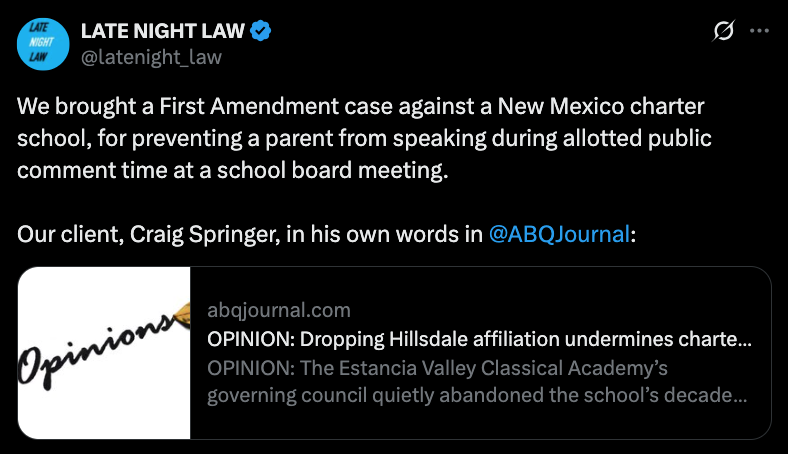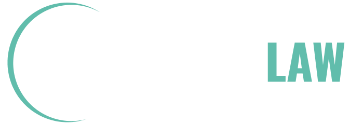
LATE NIGHT LAW is the only dedicated defamation law firm in the State of New Mexico. Because defamation law is a First Amendment area of law, we also litigate classic free speech claims under the First Amendment.
In August 2024, LATE NIGHT LAW settled First Amendment claims against a New Mexico public charter school. Our client, Craig Springer, was the parent of a high school student at Estancia Valley Classical Academy in Edgewood, New Mexico.
Estancia Valley Classical Academy was founded in 2011 as an affiliate of Hillsdale College, a liberal arts college in Michigan that provides resources for traditional pedagogy to K-12 private and charter schools. Over the summer of 2023, the governing council of Estancia Valley Classical Academy downgraded the school’s ties with Hillsdale College, without parental or community input.
When parents and teachers caught wind of this, many were upset about the change. Mr. Springer led the charge at meetings of the school’s governing council, where he was outspoken about the governing council’s lack of transparency.
At a public meeting of held in October 2023, Mr. Springer was shouted down by members of the governing council when he attempted to deliver public comments. LATE NIGHT LAW then brought suit, alleging violation of the First Amendment’s free speech guarantee, under a doctrine called viewpoint discrimination in a designated public forum.
The Supreme Court has defined three categories of public property for public forum analysis. Minn. Voters All. v. Mansky, 585 U.S. 1, 12 (2018). First, there is the traditional public forum—places such as streets and parks that have traditionally been used for public assembly and debate. Pleasant Grove City v. Summum, 555 U.S. 460, 469 (2009). In such a forum, the government may impose reasonable time, place, and manner restrictions on private speech, but restrictions based on content must satisfy strict scrutiny, and those based on viewpoint are prohibited. Minn. Voters All., 585 U.S. at 11.
Second, there is the designated public forum, where the government opens property for communicative activity and thereby creates a public forum. Minn. Voters All., supra. Such a forum may be limited for use by certain groups (such as student groups) or for discussion of certain subjects (such as school board business). Perry Educ. Ass’n v. Perry Local Educators’ Ass’n, 460 U.S. 37, 45, 46 n.7 (1983). However, within the framework of such legitimate limitations, a content-based prohibition must be narrowly drawn to effectuate a compelling state interest. Id. at 46. Public officials cannot shut down speech in a designated public forum just because they don’t like the message.
Third, a nonpublic forum is defined as a space that “is not by tradition or designation a forum for public communication.” Minn. Voters All., 585 U.S. at 11. Here, the government may reserve the forum for its intended purposes, communicative or otherwise, as long as the regulation on speech is reasonable and not an effort to suppress expression merely because public officials oppose the speaker’s view. Perry Educ. Ass’n, 460 U.S. at 46.
In Mr. Springer’s case, a school board meeting—or a similar public meeting of a charter school’s governing council, where public comment is invited—would be a designated public forum. Because Mr. Springer’s speech was curtailed on account of his viewpoint, his First Amendment rights were violated.
Mr. Springer continued to speak out during the pendency of the case, including an op-ed in the Albuquerque Journal. Estancia Valley Classical Academy agreed to settle Mr. Springer’s claims in August 2024.
If you believe your First Amendment rights have been violated, contact LATE NIGHT LAW for a free consultation at (505) 225-2623.
This article is not legal advice, and does not create an attorney-client relationship between the reader and Late Night Law. Please consult an attorney for individualized advice if you have a legal matter.
